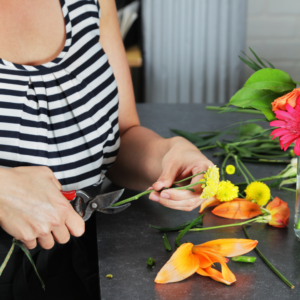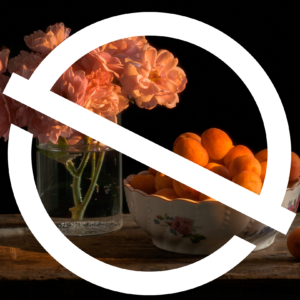How to care for your Fresh Cut Flowers
Tips on caring for your fresh-cut flowers.
 1. Make sure you start out with a very clean vase (we don’t suggest metal or any antique crystal vases) and use cold tap water.
1. Make sure you start out with a very clean vase (we don’t suggest metal or any antique crystal vases) and use cold tap water.
2. Empty your 10-gram pack of flower food into 1 litre of water. If you are going to use a larger vase, you will need more food.
3. You then cut about 1/2″ off each stem using a sharp knife or sharp shears. Please avoid scissors as they typically don’t cut well.
4. Remove all the foliage below the waterline. This will contaminate the vase water.
5. Do not place flowers in a draft, full sun, smoke, ripening fruits, or on top of a heating vent. This will cause your flowers to wilt quicker than they should.
6. Keep topping up the water with more flower food when the water has decreased to about 1/3 of the height of your vase.
Why do flowers need flower food you ask?
Once flowers are cut, they are deprived of the water, food, and growth hormones that are provided by the mother plant. In order to allow the cut flowers to still bloom in a natural way, we need to supply them with flower food in the vase water.
All cut flowers benefit from the nutrients in flower food when this is absorbed through the cutting edge of the stems. Good flower food should have the following ingredients:
- pH regulators
- Water absorption promotors
- Nutrients
This can actually help increase vase life up to 60%!!
Do NOT ballpark your food measurements
Over or underdosing your with flowers food will cause results that will be disappointing for you. Underdosing is the most critical as it shortens vase life the most. Overdosing will lead to burnt leaves and stem discoloration. So make sure you read the directions on your sachet to ensure the optimal amount of food.
Why do week keep flowers away from fruits?
 Cut flowers will drop their leaves, blooms, and buds when there is an over-production of the growth hormone ethylene ( the only known gaseous, naturally occurring growth hormone). Ethylene gas regulates the ripening or aging of cut flowers, plants, fruits, and vegetables. Meaning that ethylene will cause rapid aging of the flowers as well as the leaves ergo, they will die faster than they should.
Cut flowers will drop their leaves, blooms, and buds when there is an over-production of the growth hormone ethylene ( the only known gaseous, naturally occurring growth hormone). Ethylene gas regulates the ripening or aging of cut flowers, plants, fruits, and vegetables. Meaning that ethylene will cause rapid aging of the flowers as well as the leaves ergo, they will die faster than they should.


